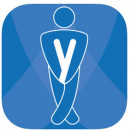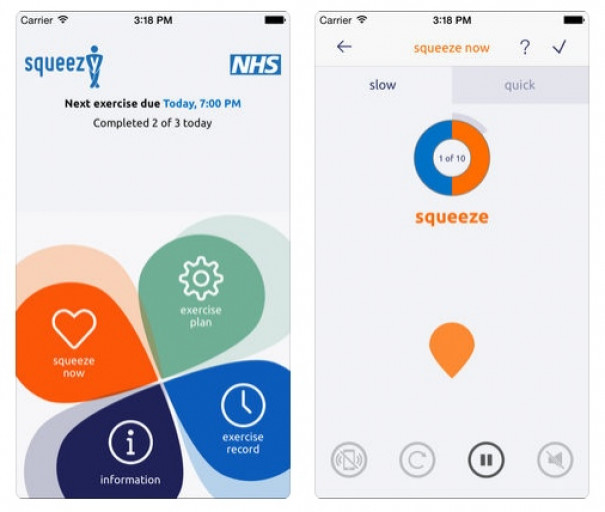| Squeezy for men: NHS Pelvic Floor app | By NHS and Living With Ltd |
 |
Features
|
| Clinical review |
|
| Security and privacy |
Read more about safety and security when using apps. Brochures: |
| Cost | Paid |
| How to get the app |
Low or no data? Visit zero.govt.nz, scroll down the page then click on our logo to return to our site and browse for free.
Squeezy for men: NHS Pelvic Floor app
Squeezy for men: NHS Pelvic Floor app
- An app to help men do exercises to strengthen their pelvic floor muscles.

The app comes preset with a standard set of exercises, but it can be personalised with a programme set by a specialist physiotherapist. It reminds you when you need to exercise and you can record the number of exercises you've completed. The app has visual and audio features to help you with your programme.
For the app description, go to App website(external link), Google Play(external link), iTunes(external link) and for a detailed review, see reviews below.
(Living With Health, UK, 2018)

| PROS | CONS |
|---|---|
|
✔ Developed with input from Women’s Health Physiotherapists, uses evidence-based research and is approved by the NHS (public health system in the UK). |
✘ Costs $6.49 |
Clinical review
![]()
Reviewer:
Jeremy Steinberg, GP, FRNZCGP
Date of review: September 2018
Platform: Android
Version: 1.2.11
Comments: This app is for men with erectile dysfunction and potentially those with urinary incontinence. However pelvic floor exercises are not commonly recommended in men. This app is the cousin to the women’s “Squeezy” app for pelvic floor exercises. Its features are similar except that the men’s version does not include a bladder diary.
The app helps men do pelvic floor exercises, and it does this very well. It allows for a self-guided or physiotherapist-guided exercise program, instructions and reminders. Pelvic floor exercises are not commonly recommended for men unlike with women, where incontinence is much rarer. There is some limited evidence that it can be helpful for erectile dysfunction and so it could be considered in this context.1 Trials on urinary incontinence have tended to focus on treatment following prostatectomy, and they have not shown consistent benefit for improvement of urinary incontinence.2 The app neglects to mention this.
The information is very similar across the two versions, and so I would recommend buying the women’s version instead because of the extra features. There is not very much information relevant to men. It costs $6.49 with there being no free version available.Unfortunately, neither version include a section of bladder retraining which could be helpful for those with urge incontinence. If you have urinary incontinence, see your doctor in the first instance.
Safety concerns: No safety concerns. There is information about when you should see your doctor.
New Zealand relevance: Developed for the NHS in the UK, however it is still definitely relevant for the NZ context. It also has links to relevant organisations in NZ.
References
- Dorey G, Speakman MJ, Feneley RCL, Swinkels A, Dunn CDR. Pelvic floor exercises for erectile dysfunction. BJU Int. 2005 Sep 1;96(4):595–7.
- Glazener C, Boachie C, Buckley B, Cochran C, Dorey G, Grant A, et al. Urinary incontinence in men after formal one-to-one pelvic-floor muscle training following radical prostatectomy or transurethral resection of the prostate (MAPS): two parallel randomised controlled trials. Lancet Lond Engl. 2011 Jul 23;378(9788):328–37.
|
Disclaimer: The NZ Health App Library is a free consumer service to help you decide whether a health app would be suitable for you. Our review process is independent. We have no relationship with the app developers or companies and no responsibility for the service they provide. This means that if you have an issue with one of the apps we have reviewed, you will need to contact the app developer or company directly. |
Credits: Healthify editorial team. Healthify is brought to you by Health Navigator Charitable Trust.





